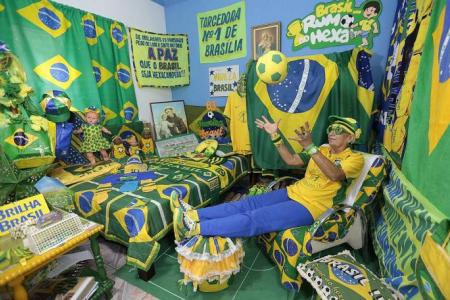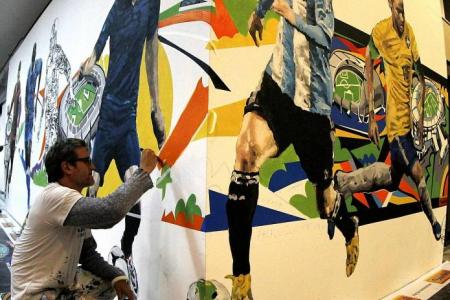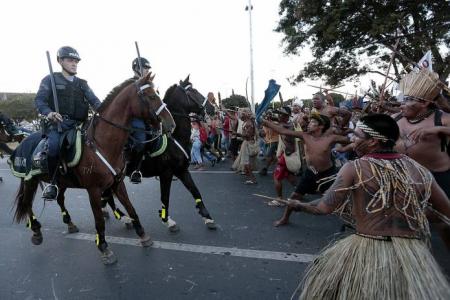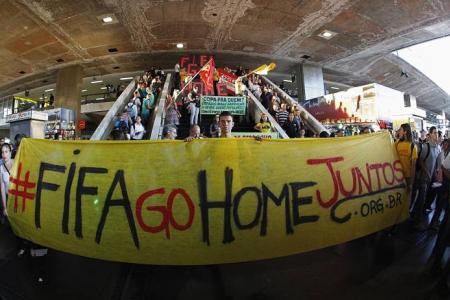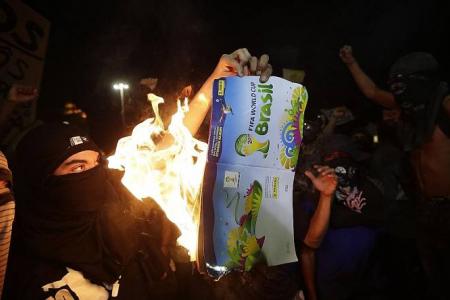The World Cup in Brazil is not all fun and games
Unrest continues as Brazil World Cup looms
The posters are up, the murals are drawn and on the surface, as these photos show, the Brazilians are ready to party at the world's greatest football festival.
The Fifa World Cup will be hosted by 12 Brazilian cities from June 12 to July 13.
But cracks are starting to show as the country races to complete the construction of several stadiums.
The most damning is a poll by the Washington-based Pew Research Center.
Six in 10 respondents said hosting the World Cup is bad for Brazil, taking the view that the billions of dollars poured into the football tournament would have been better spent on services such as healthcare, schools and public transportation, reported Reuters.

A boy rides his bicycle along Third Street of the Alvorada neighbourhood which is decorated for the 2014 World Cup in Manaus. REUTERS

Residents of Third Street of the Alvorada neighbourhood decorate their street with overhead streamers depicting the 2014 World Cup mascot Fuleco, in Manaus. REUTERS
SUPPORT ERODED
The findings dovetail with other recent surveys by Brazilian pollsters, which have also shown that support for the World Cup has eroded over the past two years as Brazil's government has failed to deliver promised roads, airports and many other investments that could have yielded long-term benefits.
The Pew survey was based on 1,003 interviews done with adults 18 years and older between April 10 and 30, nationwide.
But respondents were less pessimistic about how the World Cup would be seen overseas, with 39 per cent saying it would hurt Brazil's image abroad and 35 per cent saying it would help.
And to make matters worse, with just eight days until the World Cup begins, Brazil was rushing on Monday to finish installing seats in stadiums and to deal with threats ranging from violent protests to dengue fever, reported AFP.
The countdown to kick-off has been marred by protests - from striking drivers who abandoned their buses mid-route to indigenous leaders in bright-feathered headdresses shooting arrows at police.
Anger over the more than US$11 billion (S$14 billion) being spent on the event has raised fears of a return to the violence seen last year during the Confederations Cup, a World Cup dress rehearsal.
Then, clashes erupted as one million people flooded the streets calling for more money for social programmes and less for stadiums.
Brazil president Dilma Rousseff vowed her country had all the necessary infrastructure and security in place.
"We know we're ready. The stadiums are ready," she said. "And the fans who already know these venues know they're modern, comfortable and safe."
But on the ground, workers were still scrambling to finish the stadiums in Sao Paulo, Curitiba, Cuiaba, Natal and Porto Alegre.
The Corinthians Arena in Sao Paulo, which will host the opening ceremony and first match between Brazil and Croatia, held a hastily scheduled second test event on Sunday, but is still under construction.
Rio Mayor Eduardo Paes warned tourists not to expect Brazil to be like home.
"People who arrive in Brazil imagining they're in England will have a frustrating experience in terms of development," he said.
"Rio is a city that doesn't hide its poorest people like other places."
People who arrive in Brazil imagining they're in England will have a frustrating experience in terms of development. Rio is a city that doesn't hide its poorest people like other places.
- Rio Mayor Eduardo Paes

A local of Street 3, in the neighbourhood of Alvorada, center-west zone of Manaus, Amazonas, Brazil, on May 26, 2014, paints his house in yellow during decoration works for the upcoming FIFA World Cup 2014. AFP

A woman and a boy walk on a street decorated in celebration of the 2014 World Cup, in Teresopolis. REUTERS
Get The New Paper on your phone with the free TNP app. Download from the Apple App Store or Google Play Store now

